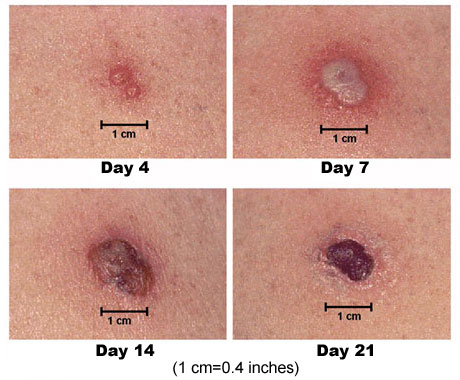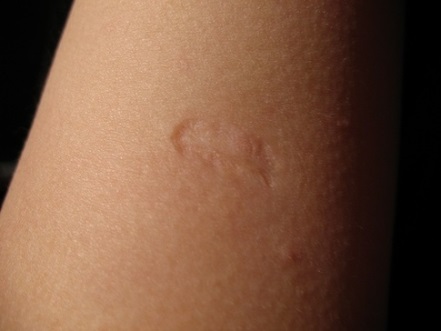Although smallpox was declared eradicated in 1980 through worldwide vaccination programs, the U.S. government is taking measures today to deal with the highly contagious and potentially fatal disease in case of the instance in which it be used as a bioterrorist weapon. This effort has become more prominent with catastrophic events like 9/11 in New York.
Smallpox is caused by variola, an orthopoxvirus genus. The only way to prevent this deadly disease is the smallpox vaccine. It presents itself with a fever and distinctive skin rash. You can tell if someone has been vaccinated by the scar left at the injection site on their upper arm.
How Does the Scar Form?
A smallpox vaccine scar is very distinctive, due mostly because the way it is administered. A nurse or doctor quickly gives the vaccinia vaccine with several punctures on your upper arm. A two-pronged needle is used to direct it into your system. After it is administered, the site of the inoculation is covered with gauze to prevent the virus from spreading to other parts of your body or even another individual. Over the course of three weeks, the injection site goes through a series of stages very similar to the smallpox rash stages. When this occurs, it is an indication that your body is building immunity to the virus.
What It Looks Like

- By day 3, a red raised bump will develop on the site of the vaccine.
- By day 5, this raised bump will fill with clear fluid.
- By day 7, the clear fluid turns cloudy and white.
- By day 10, the bump will reach its peak in size.
- Between days 14 and 21, the bump shrinks and dries up and leaves a smallpox vaccine scar.
Why Does It Occur?

The scar occurs due to the nature of the disease. The "pox" refers to the fact that the disease can cause infectious blisters on skin, as in the case of smallpox, chickenpox, etc. The way that the smallpox vaccine scar forms is quite similar to how the blisters form.
When smallpox vaccine is injected to the skin using a needle with several fork-like branches, the body would have some reactions, causing sickness or antibodies to form. When the injected spot recovers, a scar would form.
What You Should Know About Smallpox Vaccine
The smallpox vaccine consists of a mild cousin of the variola live virus called vaccinia. It cannot cause the disease and does not contain the actual smallpox virus. It also consists of lyophilized calf lymph and small amounts of polymyxin B, tetracycline, streptomycin and neomycin. The vaccine does not contain thimerosal or egg byproduct, but instead is 50 percent glycerin with a hint of phenol.
Smallpox Is Not Common Now
In 1949, the last case of the smallpox was seen in the United States. In 1977, the last naturally occurring case of the disease in the world was in Somalia. Once the disease was considered eradicated, routine smallpox vaccinations were stopped among the general population as the government and health professionals no longer deemed it necessary.
How Does Smallpox Vaccine Work?
The smallpox vaccine works by helping your body develop immunity against the disease. It contains the live virus vaccinia, which is related to but not as deadly as the virus that causes the smallpox. You cannot contract it through the vaccine. Actually, it does quite the opposite by giving your body the ability to build a defense against the variola virus which causes smallpox. Even if you have not received the vaccine and are exposed to the highly contagious disease, it can lessen the severity and even prevent smallpox if administered within 3 to 7 days of exposure.
The vaccine can be refrigerated and used for 60 days after it has been reconstituted. About 95 percent of patients are protected by a single vaccination. It takes about 10 days to become effective and lasts about five years with the initial vaccination. With revaccination, it can last 20 years or even longer.
Possible Side Effects of Smallpox Vaccine to Look Out For
The smallpox vaccine scar is not the only possible side effect from the vaccine. There are other reactions you should look out for.
Normal and Mild Reactions
- Soreness on your arm at the site of inoculation
- Enlarged and sore glands in the armpit
- Slight, low fever
- Chances of troubled sleep
- Feeling of unwellness which causes missed work or school
Severe Reactions
When the vaccine was administered to the general public, approximately 1,000 individuals out of 1 million vaccinated would experience serious reactions. Some of the more severe reactions require medication attention.
- An outbreak of sores or rash contained in one area caused by the accidental spread of the virus by touching the vaccination site and then another part of your body. It is very important to wash your hands so that this does not happen. If the infection spreads to your eyes, it can cause blindness.
- If the vaccine virus spreads through your blood, you can experience a widespread rash. Sores may appear on several sites of your body besides the inoculation site.
- If you have an allergic response to the vaccine, you can experience a toxic rash, which appears in various forms.
Dangerous and Potentially Lethal Reactions
Very rarely in the past, individuals would experience dangerous reactions to the vaccine. Less than 55 people for every 1 million would have a potentially lethal reaction that required immediate and swift medical attention.
- Development of serious skin rashes called eczema vaccinatum. It is a widespread rash and infection in individuals suffering from skin ailments like atopic dermatitis or eczema.
- Inflammation of the brain, also known as postvaccinal encephalitis.
- Development of progressive vaccinia, which is an ongoing infection that results in tissue destruction and possible death.
Warning
If you have a weakened immune system or certain medical conditions, you should consult with your doctor before getting the smallpox vaccine. You will be more likely to suffer from just a smallpox vaccine scar. You will have a greater chance of having a serious reaction. If you or your doctor has any concerns, the only time you should consider the vaccine is if you have been exposed to the smallpox.
